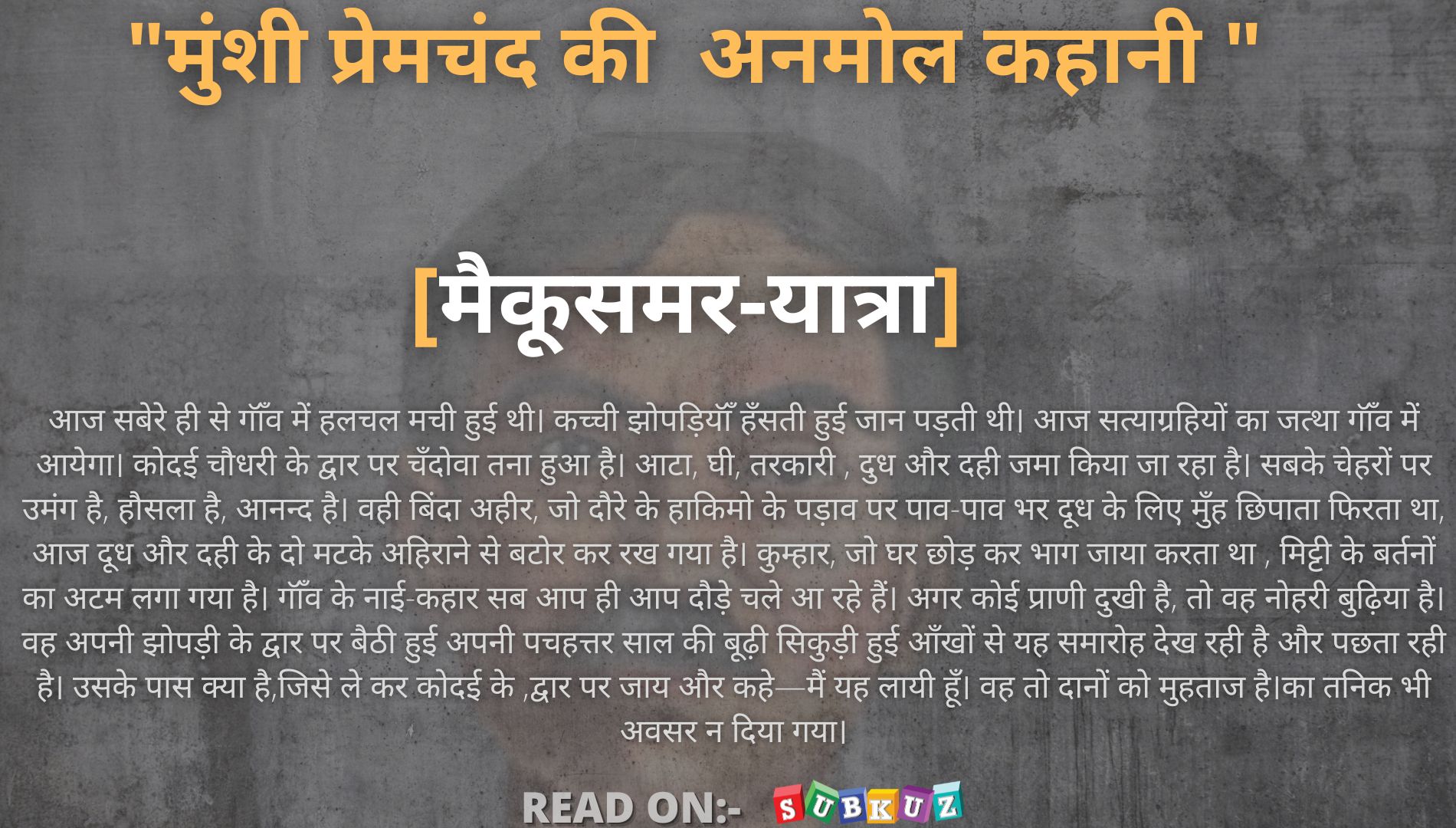Friends, our nation has been a birthplace and a land of action for great personalities, brimming with qualities like sages, poets, writers, and musicians, for centuries. The countless creations composed by these great individuals are invaluable. Today's youth, in this digital age, seem lost, and we are drifting further from our heritage and precious treasures. Subkuz.com constantly strives to bring you not only these invaluable treasures, but also entertaining stories, news, and information about the world. Here, presented before you, is one such invaluable and inspiring story by the renowned writer Munshi Premchand.
The Journey to Maiku Samer
The village was abuzz with activity this morning. The humble huts seemed to be smiling. Today, a group of Satyagrahis would be arriving in the village. A canopy had been erected at Kodai Chowdhry's doorstep. Flour, ghee, vegetables, milk, and yogurt were being prepared. A spirit of excitement, determination, and joy filled everyone's faces. Binda Ahir, who used to hide his face to avoid paying for a meager amount of milk at the travelers' camps, today had two pots of milk and yogurt ready at his doorstep. The potter, who used to run away from home, had set up his clayware stall. The village barber and craftsmen were all rushing about. If anyone was unhappy, it was the old woman, Nohari. She sat at her hut's doorway, her ninety-four year old eyes narrowed, observing the preparations, feeling regret. What did she have to offer at Kodai's doorstep? She was in dire need of any donation.
But Nohari had seen better days. Once, she had wealth and influence, the village under her sway. She had kept Kodai subservient. Despite being a woman, she was as resolute as a man. Her husband slept at home, while she ventured out to the fields. She herself handled legal matters and disputes. Every transaction was in her hands, but fate had taken everything away; wealth and influence were gone, and only grief remained. Her eyesight was failing, her ears were deafened, and it was difficult for her to move. She was eking out a living somehow, while Kodai's fortunes had risen. Kodai was now sought after; his reputation grew in the community. The gathering was happening at Kodai's doorstep. Who now would care for Nohari? This thought seemed to crush her spirit. Oh, if only God had not made her so frail. She could have decorated her hut, had the music played, and prepared sweets and treats for the visitors to enjoy, offering them a token of gratitude.
She remembered the day she had traveled twenty miles with her elderly husband to see Mahatmaji. That enthusiasm, that spiritual love, that reverence now surged within her, like dark clouds in the sky.
Kodai, upon approaching, said with a stern voice, "Bhabhi, today Mahatmaji's group is arriving. You too should offer something."
Nohari looked at Chowdhary with piercing eyes. "A cruel man, come to judge me, seeking to humiliate me." She spoke with a voice as loud as the heavens, "Whatever I have to offer, I shall give to those who deserve it. Why should I offer it to you?"
Kodai smiled and said, "We won't tell anyone. Tell the truth, Bhabhi. Bring out that old pot. Why hold onto it? No one else has offered anything. How will the village's reputation be maintained?"
Nohari said, with a tone of quiet dignity, "Don't add insult to injury, brother-in-law! Had God given me something to offer, it wouldn't have come down to this. Today, saints, sages, rulers, and administrators came to this very doorstep, but not all days are the same."
Kodai felt ashamed. The wrinkles on his face seemed to quiver. "You always have a way of making things worse, Bhabhi! I only meant to avoid you complaining later that no one asked you for anything."
With this, he walked away. Nohari remained seated, gazing at him. His words felt like a serpent coiled before her.
Just as Nohari was sitting, a commotion arose—the group had arrived. A dust storm rose from the west, as if the earth itself was showering its treasures to welcome the travelers. All the men and women of the village, abandoning their work, rushed to greet them. In an instant, a tri-colored flag fluttered in the breeze, as if the kingdom of freedom itself blessed all with its presence.
The women started singing songs of peace and prosperity. Soon, the group of travelers was clearly visible. Rows of two men stood side-by-side, each wearing a khadi kurta, a Gandhi cap on their heads, and a satchel slung across their shoulders; their hands were empty, as if ready to embrace the freedom of the nation. Their voices now echoed—a national anthem emanated from their resolute throats, warm and deep, inspiring the hearts of all.
…
```








